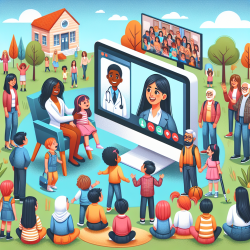Introduction
In the dynamic field of speech-language pathology, practitioners strive to make informed decisions that lead to the best outcomes for children. The research article titled "Herbal remedy clinical trials in the media: a comparison with the coverage of conventional pharmaceuticals" offers valuable insights into how media coverage can influence public perception and decision-making in healthcare. By understanding these influences, practitioners can enhance their evidence-based practices and improve therapy outcomes.
The Research Findings
The study systematically compared newspaper coverage of clinical trials for herbal remedies with those for pharmaceuticals. It revealed that media coverage of herbal remedy trials was generally more negative than that of pharmaceutical trials. This negativity was only partially explained by the higher proportion of herbal trials reporting negative results. Furthermore, errors of omission were prevalent, with insufficient reporting on critical trial details such as dose, sample size, and trial duration.
Implications for Practitioners
Understanding the research findings can empower practitioners to critically evaluate the information presented in media reports and make data-driven decisions. Here are some key takeaways for practitioners:
- Scrutinize Media Reports: Be aware of potential biases and omissions in media coverage. Verify the information against original research articles to ensure accuracy.
- Emphasize Evidence-Based Practice: Prioritize clinical trials and research studies published in reputable journals. Incorporate these findings into therapy planning to ensure interventions are grounded in solid evidence.
- Educate Stakeholders: Use your expertise to educate parents, teachers, and other stakeholders about the importance of evidence-based interventions. This can help counteract misinformation and build trust in therapy outcomes.
Encouraging Further Research
The study highlights the need for more comprehensive media reporting on clinical trials. Practitioners can play a crucial role in advocating for better media practices by:
- Collaborating with Journalists: Engage with media professionals to provide accurate information and highlight the significance of evidence-based practices in speech-language pathology.
- Participating in Research: Contribute to research efforts that aim to improve the quality of media coverage of clinical trials. This can lead to better public understanding and acceptance of evidence-based therapies.
Conclusion
By understanding the nuances of media coverage and its impact on public perception, practitioners can enhance their ability to make informed, evidence-based decisions. This not only improves therapy outcomes but also fosters greater trust and collaboration with stakeholders. To delve deeper into the research, read the original research paper.










